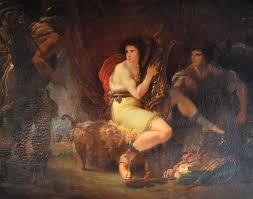
Tuesday
One of my most satisfying reads in recent years is Caroline Alexander’s The War That Killed Achilles: The True Story of Homer’s Iliad and The Trojan War. Alexander is the kind of writer that I aspire to be: an academic who taps into the meticulous research of other scholars to write for a popular audience. This audience, Alexander believes, needs the insights into war that Homer offers us. As she points out,
The Iliad’s evocation of war’s devastation…is as resonant today—perhaps especially today—as it was in Homer’s Dark Age. Now, as at any time, Homer’s masterpiece is an epic for our time.
According to Alexander, Homer does not glorify war but exposes its utter waste.
I thought of our endless war in Afghanistan as I read Alexander’s account of the Iliad. Both go on and on with no apparent end in sight, with the Greeks having all but forgotten why they are fighting it. The few tantalizing possibilities of peace go for naught, and in the end the war will spell the end of the Greeks as well as the Trojans. Few successfully reach home after Troy falls.
Achilles is a reluctant participant in the war. Alexander notes that at one point he sounds like draft-resisting Mohammad Ali as he argues with Agamemnon. First, Achilles:
I for my part did not come here for the sake of the Trojan
spearmen to fight against them, since to me they have
done nothing.
Never yet have they driven away my cattle or my horses,
never in Phthia where the soil is rich and men grow great
did they
spoil my harvest, since indeed there is much that
lies between us,
the shadowy mountains and the echoing sea; but for your sake,
o great shamelessness, we followed, to do you favor.
And now Ali:
I ain’t got no quarrel with the Viet Cong…No Viet Cong ever called me nigger….I am not going 10,000 miles to help murder, kill and burn other people to simply help continue the domination of white slave masters over dark people.
As Alexander reads the epic, Achilles is a natural-born leader as well as the Greeks’ preeminent warrior. Because he is serving under an inept commander, any number of issues arise regarding military codes of conduct. Despite images of horrendous slaughter, however, what finally emerges are moments of humanity, as when Achilles grants Priam permission to reclaim the body of Hector.
So why do we think that The Iliad glorifies war rather than castigating it. Alexander observes that early audiences didn’t make this mistake:
Writing in the first century B.C., Strabo summarized the far-reaching consequences of the disastrous war at Troy as it was understood by later history: “For it came about that, on account of the length of the campaign, the Greeks of that time, and the barbarians as well, lost both what they had atthome and what they had acquired by the campaign, and so, after the destruction of Troy, not only did the victors turn to piracy because of their poverty, but still more the vanquished who survived the war.”
Alexander explains that readings of the poem changed once it began to be taught in school:
[T]he elite schools whose classically based curriculum was dedicated to inculcating into the nation’s future manhood the desirability of “dying well” for king and country. Certain favorite outstanding scenes plucked out of context came to define the entire epic: Hector’s ringing refusal to heed the warning omen, for example— “One bird sign is best: to fight in defence of our country”–or his valiant resolution—“not die without a strangle and ingloriously.” Homer’s insistent depiction of the war as a pointless catastrophe that blighted all it touched was thus adroitly circumvented.
The final Homeric glimpse we get of the Trojan War occurs in The Odyssey, which Alexander uses to punctuate her point. Odysseus, still in disguise, requests that Phaiakian bard tells the story of the Trojan horse, only to be reminded of war’s horrors:
As a woman weeps, lying over the body
of her dear husband, who fell fighting for her city and people
as he tried to beat off the pitiless day from city and children;
she sees him dying and gasping for breath, and winding her body
about him she cries high and shrill, while the men behind her,
hitting her with their spear butts on the back and the shoulders,
force her up and lead her away into slavery, to have
hard work and sorrow, and her cheeks are wracked with
pitiful weeping.
Such were the pitiful tears Odysseus shed from under his brows.
We should all be crying as we remember the deaths in Afghanistan, Iraq, Vietnam, Korea, World War I, and all those other pointless wars. Homer sounds like an early day Wilfred Owen.